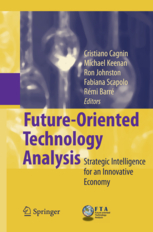 |
Revisiting Foresight Rationames: What Lessons from the Social sciences and the Humanities?Ouvrage par Barré Rémi et Keenan Michael The argument in this chapter is that whilst the objectives set for foresight are increasingly wide-ranging, the conceptualisations of these activities, as indicated by their ‘intervention theories’, are somewhat lagging behind the latest insights offered by the social sciences and humanities (SSH). This conceptualisation gap has led to a situation where foresight activities are insufficiently understood, or even misunderstood, making any assessment of their outcomes problematic. At the moment, policy makers and analysts are still trying to better define the expected outputs and outcomes of foresight, based largely upon an empiricist approach of learning from case experiences. Whilst an empiricist (inductive) approach is worthy and most definitely necessary, the argument in this chapter is that it is insufficient on its own. We argue that to improve our understanding of foresight, we must turn to the SSH for a more deductive mode of enquiry. In: Future-Oriented Technology Analysis ISBN : 978-3-540-68811-2 URL: http://www.springer.com/economics/r+%26+d/book/978-3-540-68809-9 |